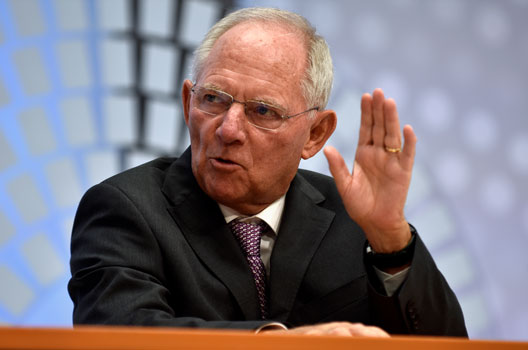 An undercurrent of apprehension regarding global affairs and concern in the aftermath of the US presidential elections defined the 6th Berlin Foreign Policy Forum, held on November 29 by the Körber Foundation in Berlin, Germany.
An undercurrent of apprehension regarding global affairs and concern in the aftermath of the US presidential elections defined the 6th Berlin Foreign Policy Forum, held on November 29 by the Körber Foundation in Berlin, Germany.
In a wide-ranging and deeply contemplative dialogue, Wolfgang Schäuble, Germany’s Federal Minister of Finance, made the case for a strong Germany within a united Europe, as the world prepares for the possibility of the United States playing a smaller role on the global stage.
The annual event brought together an international crowd of 250 politicians, officials, journalists, and experts to address key questions for German foreign policy at a time when, according to Thomas Paulson, member of the Executive Board of the Körber Foundation, Germany has “become more confident and aware of its responsibility to contribute to international peace and security….while still struggling to strike a balance between leadership, active engagement, and traditional restraint.” Over the course of the day, participants also heard from Frank-Walter Steinmeier, Germany’s Minister of Foreign Affairs; and Paolo Gentiloni, Italy’s Minister of Foreign Affairs and International Cooperation.
A recurring question throughout the conference was the ability of traditional systems and institutions to address the sweeping changes taking place across the globe. Participants discussed the challenges associated with the conflict in Syria, the resulting refugee crises across the Middle East and Europe, the Iran nuclear deal, the role of Asia in the changing global dynamic, and the result of the US presidential election.
There was a great deal of concern and uncertainty stemming from the lack of a coherent agenda articulated by US President-elect Donald Trump. Questions regarding his campaign rhetoric, potential disengagement from key international institutions, US relations with Russia, and the temperament of the president-elect, among others, permeated conference rooms and dinner tables.
In the wake of Brexit, the United Kingdom’s decision to leave the European Union (EU), and the rise of right-wing parties such as France’s National Front, Schäuble’s task, arguing for stronger European integration, was not an easy one.
Polling results speak to the complex dichotomy pervading public opinion. In October 2016, to gauge the response to some of Europe’s biggest challenges, the Körber Foundation commissioned TNS Infratest Policy Research to carry out a nationwide representative survey of 1,001 Germans aged eighteen and above on Europe and German foreign policy. Although the majority of those polled did not feel that the EU and its member states were on the right track, they also indicated a desire to see a strong Europe that is capable of taking unified action. Participants feel that Germany should expand its leadership role within the EU and show more solidarity with member states, while also believing that Germany has been excessively burdened by the refugee crisis and should assert its own interests in times of crisis even against those of other member states.
The challenges articulated by Schäuble mirror those facing the United States leading up to a Trump administration. His comments, as well as the myriad discussions throughout the conference, illuminated the importance—now more than ever—for continued cooperation between the United States and Europe on these common tasks, in particular:
Refugees, Migration, and Immigration: Schäuble underscored the importance of preparing European societies for the continued flow of migrants, looking for solutions at the micro (city) level, and addressing genuine fears and anxieties related to a new flood of immigrants and refugees. Similarly, although the United States has more control over those entering the country, a Trump administration must shift its threat-based narrative regarding immigration and refugees to a more pragmatic and humanitarian one. It must work with cities across the United States to ensure that incoming refugees are allowed to integrate and contribute economically while ensuring proper security standards to keep US citizens safe. In the end, preventing further flows of people across borders means addressing the root causes of involuntary migration, and as such, a strong and empowered EU is in the interest of the United States.
The Danger of Extreme-Right Policies: Brexit, Mr. Trump’s victory, and the possibility of a National Front victory in the French presidential elections (particularly in the wake of Thursday’s shock announcement by current French President Hollande that he will not seek reelection) were clearly causes for concern among conference participants. The assumed implications of this rightward-moving global trend are serious: a rejection of globalization, isolationist policies, the expulsion of immigrants, and the failure to end the civil war in Syria.
Isolation versus “Shaping the Environment”: There was widespread agreement among conference attendees regarding the need to shape the environment, given that the most pressing challenges facing Western societies cannot be solved by turning away. Schäuble said, “We cannot withdraw from the world, so we must shape it.” The same holds true for the United States, and this idea should shape the narrative of the Trump administration starting right now.
Jasmine El-Gamal is a resident senior fellow with the Atlantic Brent Scowcroft Center on International Security. You can follow her on Twitter @jasmineelgamal
Image: Wolfgang Schäuble, Germany’s Federal Minister of Finance, (pictured above) said: “We cannot withdraw from the world, so we must shape it.” (Reuters/James Lawler Duggan)
